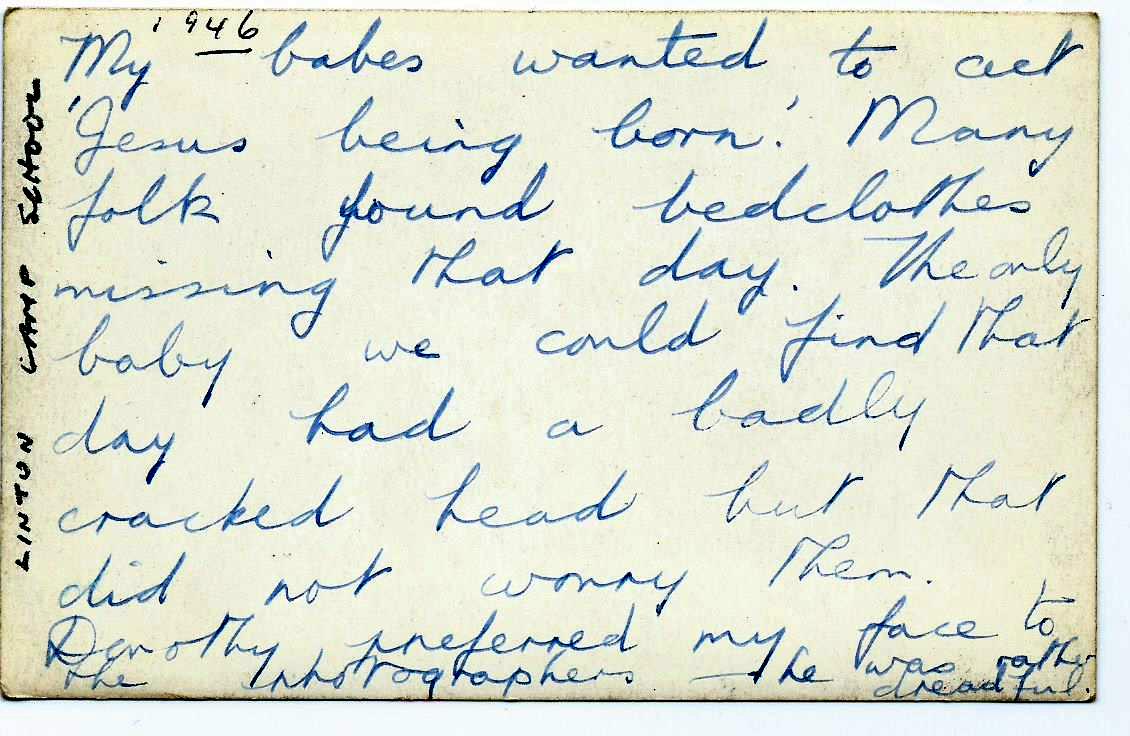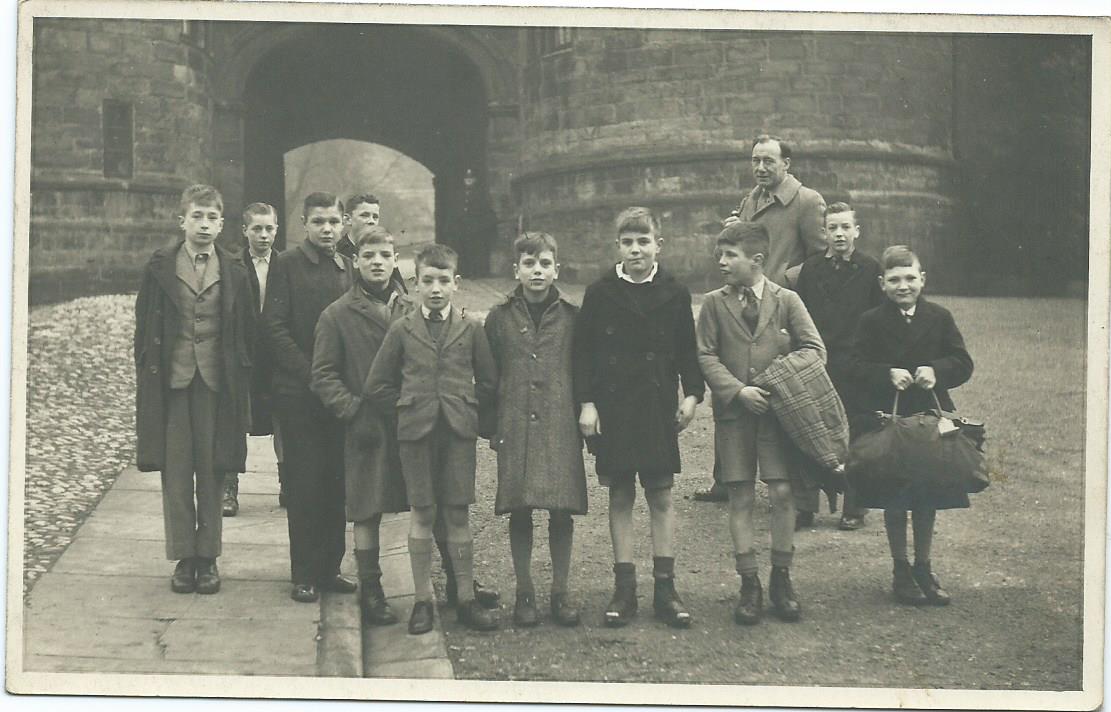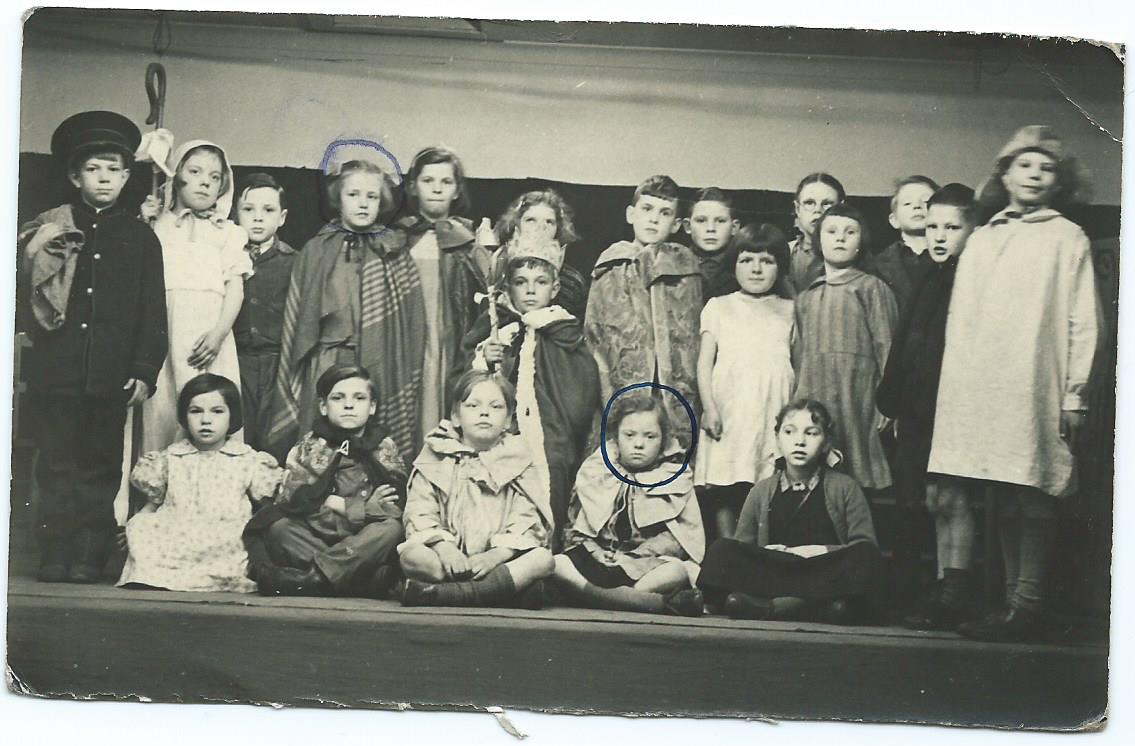Linton or Linton? Sheila Thornton
I began my teacher training at Avery Hill, London, when I was 18. It was a two year residential course in those days, but because of the war we were evacuated to Huddersfield and billeted out. Dr. Consett was the principal and she'd worked at Bingley Training College, not far from where I live now. Whilst in Huddersfield we were asked to volunteer to go to Linton to help at weekends. My friend, Marjorie Webb, and I volunteered to go and I really enjoyed every minute of it!
I qualified as a teacher in 1943 and my first job was at a school at Oswestry in Shropshire where I worked for two years. Oswestry was an easy place to work, the children were well-mannered and normal and I decided that if I didn't make a move whilst I was young then I could easily end up making the mistake of staying too long. So I decided to move from Oswestry. I looked through the paper and found that teachers were needed at Linton in Devon and at Linton in Yorkshire. I decided on Yorkshire as it wasn't too far from my home in Shropshire and I could afford to cover the cost of travelling. (My first wage as a teacher in Oswestry was eleven pounds a month, after deductions, and out of this I paid two pounds and five shillings for bed and breakfast).
I travelled to Bradford for my interview and sat next to a young lady whose name I later found out was Wynne Waddington. She told me that she taught in Bradford and that she thought they hadn't been very fair in calling me up for an interview when they promised the job to her! However, I did get the post and I was very surprised to meet up with Wynne again at Linton at the start of my second term. She said that after I was given the job she was told that there was a place for her, but a term later if she wanted it which obviously she did. Eventually she married another of the Linton teachers, Bill Anderson.
Soon after starting work at Linton I got engaged and we arranged the wedding for March27th 1948. I decided that if I worked at Linton until the end of the Spring Term then the time would be too short before the wedding, so I finished at Linton in the December of 1947.
After Linton I taught at the Macmillan Special School in Bradford until February 1952. I had a break from teaching when we started a family, but began doing supply work in the Bradford area in about 1957. This eventually led to a permanent job at Albert Road Infant School in Saltaire, and which later became Saltaire First School. I retired from there as deputy head in 1983.
I remember my time at Linton as being a very happy two years.
Nobody swears better than the Head at Linton! Sheila Thornton
There was a rule at Linton which forbade swearing. It was a necessary rule because the lads particularly could come out with some choice phrases! I remember that on one occasion there was a boy who decided that this rule didn't apply to him. After ignoring several warnings he found himself face to face with Mr. Sternwhite, the headteacher. “So you think you can swear?” said Mr. Sternwhite. “Well let's have a competition, and if I win then you stop swearing and if you win then you can carry on.” The challenge was too good to refuse! Unfortunately for the young lad Mr. Sternwhite's collection of choice expressions, carefully gleaned from many years of teaching, won hands down. The rule stayed in place, and the culprit left, suitably deflated!
Linton School and a Winter to Remember. By Sheila Mary Thornton (nee Clarke).
It was the January of 1947 and I had gone for an appointment at the BRI for a mastoid condition, later calling in at Saltaire to pick up two pairs of shoes that I'd bought in the sales at Feathers Shoe Shop on Gordon Terrace. Then I got the bus back to Skipton. Arriving there I went to get the Grassington bus and discovered to my amazement and annoyance that the buses had stopped running because of heavy snowfalls in the Dales. I decided I'd walk part way and see if I could get a lift, only to discover that there were no motorists either as I saw no traffic going that way. So I set off to walk and got to Cracow where I went into the pub, which was the only place I could see open, to use the bathroom. There was a lady serving at the bar and there was one man, who as it turned out was from Grassington and was also trying to get back there. He said that if I was walking then he'd walk with me. So I had a hot drink and we set off together. By this time the weather was so bad that I really was frightened but I daren't turn back so I decided I'd better go on. When finally I got to the school it was 6pm and the headmaster, Mr. Sternwhite, was so pleased to see me. He said, “Thank God you've come Mary, there's half the staff down with flu!” (At Linton I was called by my second name, Mary, to avoid any confusion with another Shelagh who was the welfare lady). He was trying to get the little girls showered so was very pleased to have me there to take over. Another thing he said was “Have you had anything to eat, Mary?” and he put his hand in his pocket and pulled out an apple and said “Here you are.” It wasn't very much but after all that walking I was glad to have it!
After that it was a couple of weeks before we saw anybody again, in fact the next teacher to arrive arrived on skis and bringing food! Food became very precious and we were worried the cook might run out of ingredients for the bread. Men were allowed three slices a day, and the women two, but of course it was the children who had most of it. Fortunately the electricity kept going because it came through from Lowcock's Mill where there was an emergency generator.
Clean clothing was also a worry. We couldn't get in or out so there was hardly any washing of clothes, nor could the local helpers get in to wash anything. Items that were desperately soiled the staff had to wash by hand. The clothing we had was very good quality and had arrived, only just in time before the snow set in, as a gift from Canada. This very appreciated donation contained clothing both for adults and for children and was put to good use as some of the children came to Linton only with very poor clothing. The head said, “Let the children have their pick, and then the staff afterwards.” I managed to get a pair of jodhpurs (horse riders’ breeches) which were nice and warm.
During these two weeks of enforced isolation the classrooms were all locked up, and lessons were conducted in the dormitories themselves. I was in charge of Dormitory 5 and by getting up early every morning we managed to dig a way through to the washroom which was just opposite. In this way the children were able to go across and get washed every day as usual. Our isolation was increased by the fact that the phone wires were down as well. We were definitely 'on our own'!
Every night, after the children had been put to bed, the staff met in the staffroom and Mrs Ellison, one of the two deputy head-teachers, read a list of things that needed doing, such as mending clothes, and each teacher was given his or her share of the appointed tasks. At that time there was a young man working with us as a helper. He was a student at Leeds University and was very quiet and shy, and on one occasion he failed to come to the meeting on time. When he did arrive Mrs Ellison said she thought he would be pleased with what she'd got for him to do, and promptly pulled out several pairs of knickers that needed elastic putting in them! He nearly fell over with shock, but the rest of us nearly fell over with laughter!
It was a hard two weeks, and an experience that I wouldn't like to repeat, but we got through. Believe it or not, the first vehicle that did eventually get through to us was a British Army tank!
Goodnight Kisses. Sheila Thornton
When I worked at Linton (1946 -7) we had a total of about fifty-two girls and at night they would sleep twenty-six to a dormitory. Two teachers, Alison Thomas and myself, were in charge of Dormitory 5 which was for the youngest girls, the oldest of whom were about ten years old. The walls of the dormitories were rather drab and colourless so I painted pictures to brighten the place up a bit. Some of the girls were bed-wetters so at ten o'clock every evening we would wake them up to use the mobile toilet which we wheeled around to their beds. If anybody did wet the bed then they were expected to wash their sheets themselves the next morning. I don't think this really was a very good idea as some of them couldn't help it, and sometimes the other pupils would make fun of them.
Alison Thomas and I would take turns to have the weekends free. Looking after a dormitory would have been a big job for just one person, so were grateful for the volunteers who came up from Bradford to help. Most of them were teachers, others were students, but each of them came because they enjoyed it. On those weekends when I was on duty my fiancé, Bert, would cycle up from Saltaire to see me. The girls loved his visits because at bedtime he would sing to them and they would join in as well. One evening, after the singing had finished, one of the girls asked Bert for a goodnight kiss, so Bert gave her one! Well that was it, from then on all the girls wanted a goodnight kiss! Poor Bert couldn't cycle home again on Sunday evenings until twenty-six girls had all been kissed goodnight!
I know this wouldn't be allowed today, but it meant a lot to those little girls, living such a long way, as it seemed to them, from their loved ones.
Linton's POWs. Sheila Clarke.
I started working as a teacher at Linton in 1946 and I worked there for the two years prior to my marriage in March 1948. The war had not long since ended and for a time we had two young prisoners of war helping us with maintenance and all the odd jobs. The first was an Italian POW. I can't remember his name but he would have been about twenty years old. He loved his time at Linton and got on well with staff and pupils alike. The children loved him because he could dance really well and often on Saturday nights there would be either a dance or a show. One Saturday night the children were going to watch a film together and they all went into the room where the film would be shown and the Italian POW was standing there with them too. As they were all being rather noisy the person in charge told them to “Sit down and be quiet”. Everybody sat down, except our Italian friend! He didn't speak much English and hadn't understood the instruction, which all the children thought was very funny! He loved the children at Linton and even tried to avoid repatriation when the time came by running away. Eventually however he was repatriated. I often wonder what happened to him. I hope he was able to be happily reunited with his own family again, after being a part of our family at Linton.
The next POW to help us was a young man from Germany, where his parents owned a farm. I remember that he always carried a family photograph in his pocket. He was not very communicative even though the children often encouraged him to talk. He seemed to us a little bit 'starchy' at the time, but I think on reflection he was just desperate to be at home on the farm and with his family again.
The Daily Routine at Linton. Sheila Thornton
The teachers got up first at about 7am. and the children about half an hour later. They washed themselves or had a shower if they needed it and then went down to the dining room which was next door to the teachers´ dining room. The children had a good breakfast of flakes or porridge followed sometimes by sausages and bacon. Afterwards they went out to play until lessons started at 9 'clock. Classes continued until 12, after which they had a good dinner, especially considering that it was just post-war. The children were taught in mixed groups with about thirty in each class. In the afternoons they had activities, such as long walks, swimming in the tiny pool, handwork or sports, until tea-time. After tea the children were free to play outside (there was no television) until it was time to wash and go to bed, starting with the little ones.
At weekends we tried to organise something special such as Saturday night dances. Gramophone records provided the music and the staff joined in with the dancing. On Sundays there was chapel for those who wanted. The older children went to the local church and I took the younger children to the Methodist Chapel in Grassington where they were very warmly welcomed.
We tried to make their life at Linton as much like normal family life as possible. Parents came on a special bus which ran monthly, on Sundays. Our oldest children were sixteen, which was the oldest you could be at Linton.







The above photos from Sheila include the description on the back. I would imagine the subjects depicted here are well into their 80's and beyond now. May I suggest that if possible, this page is shown to any parents, grand parents, who are known to have been at Linton around this time? Somebody may recognise somebody, or even themselves! If so, do please email me!
The photo showing "Robbie", in charge of a group of boys visiting Skipton Castle, is George Robson, or cheesy, as he was known by the boys in the 50/60s. This must be the earliest photo we have of him, in fact I had to enlarge the photo to recognise him, but his tell tale pipe gave him away!

